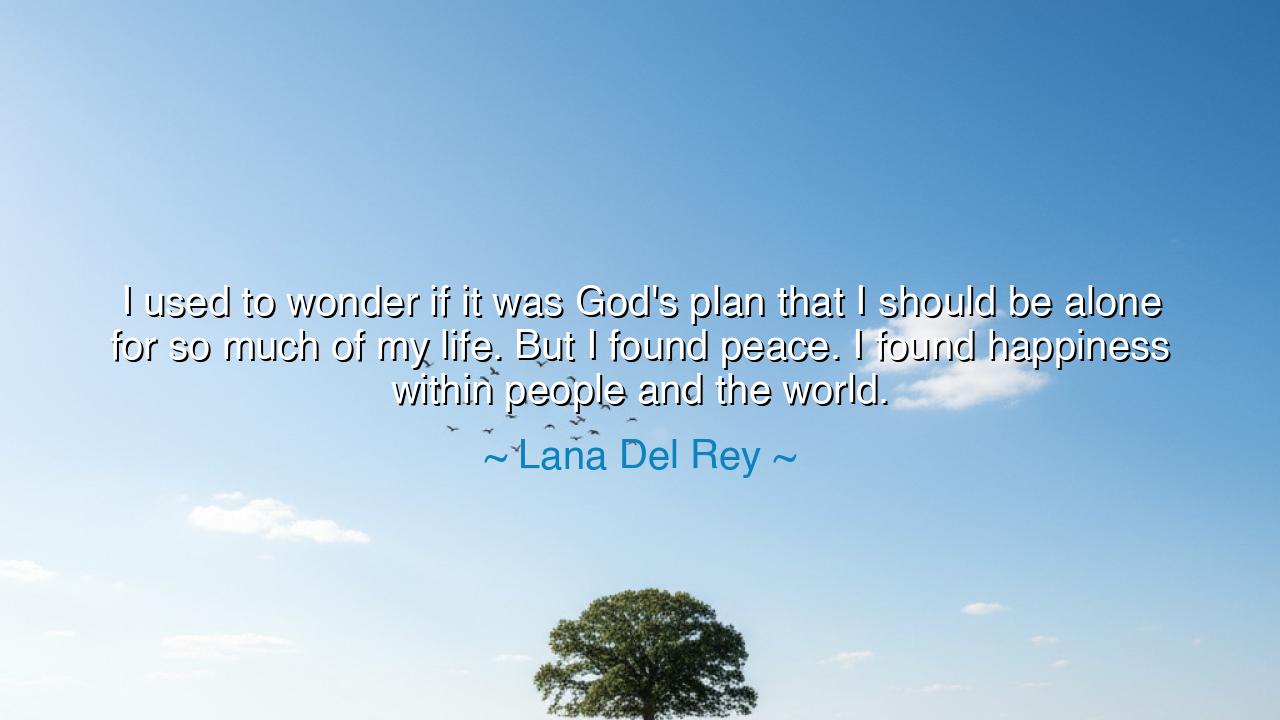
I used to wonder if it was God's plan that I should be alone for
I used to wonder if it was God's plan that I should be alone for so much of my life. But I found peace. I found happiness within people and the world.






"I used to wonder if it was God's plan that I should be alone for so much of my life. But I found peace. I found happiness within people and the world." These words by Lana Del Rey reflect the profound journey of a soul seeking understanding in the face of solitude and the eventual realization that peace and happiness are not solely found in external companionship, but in the connection with both people and the world itself. It is a poignant expression of self-discovery, where one learns that isolation, though seemingly burdensome, can lead to a deeper understanding of oneself and the universe.
In the ancient world, the concept of solitude was often seen as both a trial and a test of character. The great philosophers and mystics of antiquity, such as Socrates, Diogenes, and Buddha, spent significant periods in isolation. For them, solitude was not a state of despair, but of reflection, clarity, and spiritual growth. Socrates, for example, believed that true wisdom could only be attained through self-examination and the pursuit of inner truth, and he often sought solitary moments to engage in this deep introspection. His life exemplified that peace could be found within, even if surrounded by external chaos. Del Rey’s reflection aligns with this ancient wisdom: true contentment lies not in the external circumstances, but in the acceptance and peace found within.
Diogenes, the Greek philosopher, took solitude to an extreme, rejecting societal norms and the pursuit of material wealth. He chose to live in a barrel, seeking the simplest form of existence. His life was a declaration that freedom and peace come not from external sources, but from the liberation of the self. In his isolation, Diogenes found contentment in the present moment, teaching that happiness is not dependent on possessions or relationships, but on one's ability to find joy in simplicity. Similarly, Del Rey’s acknowledgment of solitude as a path to inner peace echoes the same idea: happiness can be found by engaging with the world without the expectation of needing to be constantly surrounded by others.
Consider also the life of Mahatma Gandhi, who spent many years in relative solitude in order to reflect, write, and strengthen his resolve for the cause of Indian independence. While his leadership eventually united a nation, Gandhi’s early years of self-imposed solitude allowed him to cultivate an unwavering inner strength and a deep understanding of his role in the world. Gandhi’s peace, like Del Rey’s, did not come from being surrounded by others, but from finding purpose and happiness in the simple truths of life and the connections he made with humanity at large.
In modern life, solitude can often be seen as a curse, as something to be avoided at all costs. Yet, as Del Rey’s words suggest, it is in solitude that we often discover freedom and peace. The busy pace of modern life, with its constant distractions and pressures to connect, can leave little room for the type of introspection and peace that solitude offers. But just as the ancient philosophers and modern leaders found solace in their solitary moments, so too can we. Del Rey’s realization that happiness comes not just from the company of others, but from the ability to find peace within ourselves, speaks to a universal truth: it is not our circumstances or relationships that ultimately determine our happiness, but our ability to find joy in the world around us.
The lesson from Del Rey’s reflection is one of self-reliance and contentment. In a world that often urges us to seek external sources of validation, we must remember that peace and happiness are within our reach. We must learn to embrace solitude as an opportunity for growth, reflection, and a deeper connection with the world. It is through inner peace and self-acceptance that we are able to connect with others meaningfully, without the burden of dependency.
In our own lives, we can take a lesson from Del Rey and the ancient philosophers. Let us seek moments of solitude not as a punishment, but as an opportunity to grow and reflect. Let us learn to find peace within ourselves, knowing that the love and companionship we seek from others are only truly fulfilling when we first understand and nurture our own inner world. In doing so, we can live with a deep sense of purpose, joy, and freedom, finding contentment not just in the world around us, but in the peace we cultivate within.






AAdministratorAdministrator
Welcome, honored guests. Please leave a comment, we will respond soon